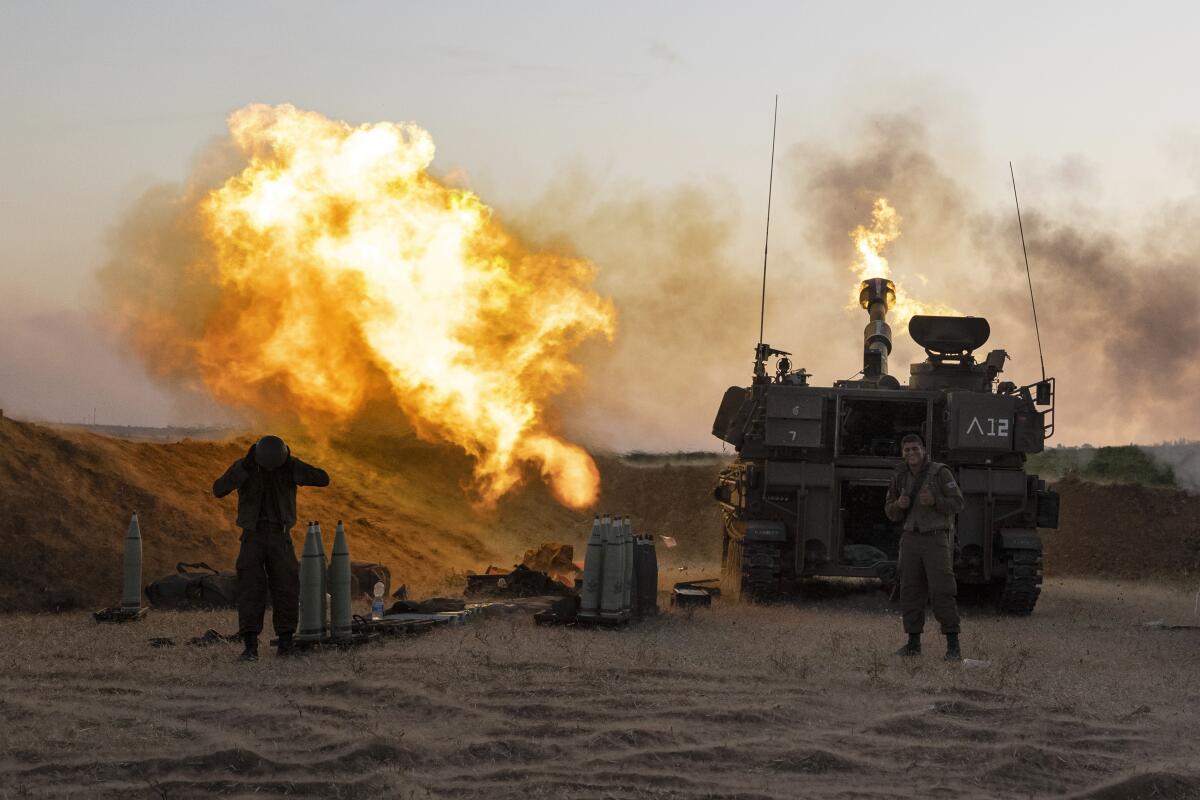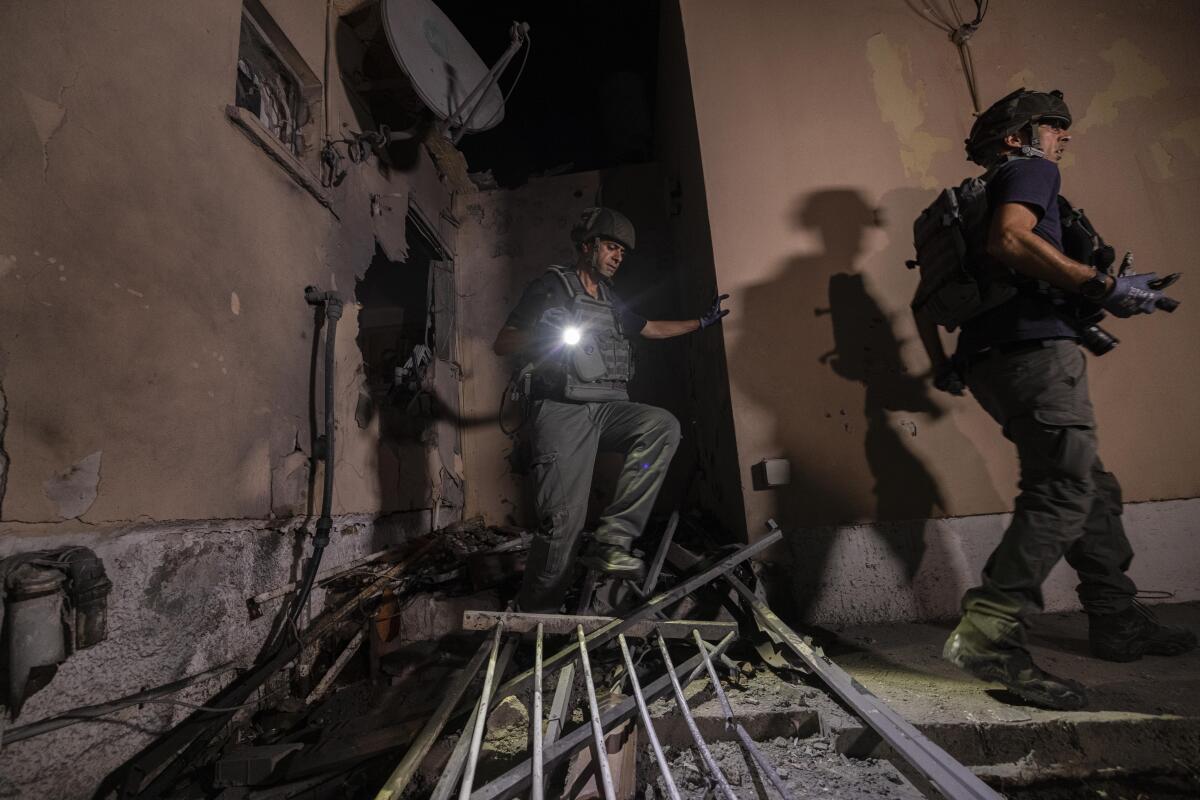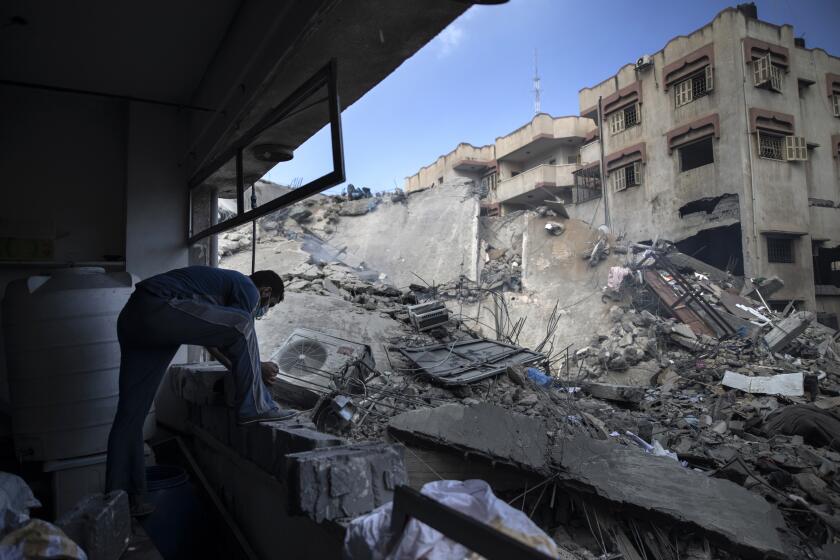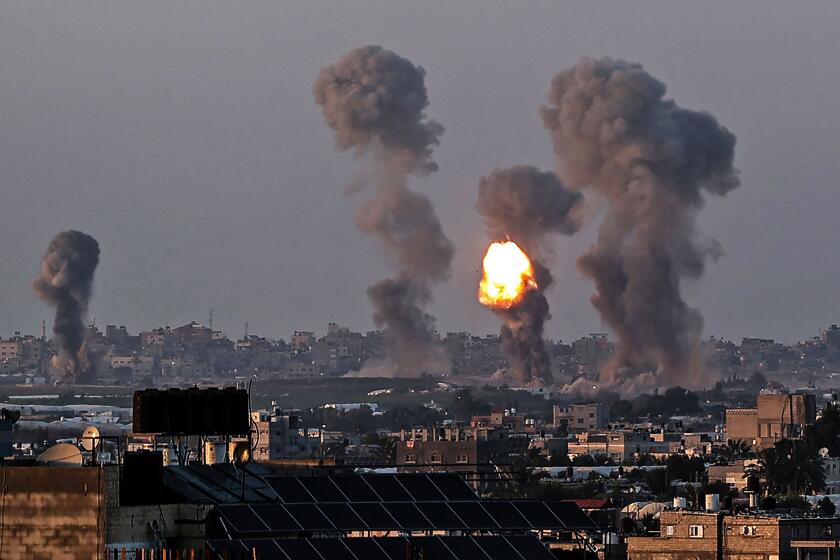Gaza cease-fire calls grow even as Netanyahu publicly plays down Biden admonition

- Share via
TEL AVIV — Israeli Prime Minister Benjamin Netanyahu on Wednesday publicly shrugged off the strongest U.S. call yet to wind down fighting with Hamas militants in the Gaza Strip, but there were growing indications he would accede to international pressure for a cease-fire.
A 10th day of intense exchanges of fire saw Israeli forces again carry out airstrikes against dozens of militant targets in the small coastal enclave, while Palestinian militants fired new volleys of rockets into Israeli towns and cities.
Early Thursday in Gaza City, orange flashes lighted up the sky, as the thunder of heavy bombardment drowned out the morning call to prayer.
The fighting has killed at least 227 Palestinians, 64 of them children, and 12 people on the Israeli side, including a small child, a teenager and a soldier.
Israel continues its assault on the Gaza Strip as the U.S. and others call for a cease-fire.
The White House announced that President Biden had told Netanyahu in a phone call Wednesday — their second in three days — that he expected to see “significant de-escalation today” as part of a move toward a truce.
Netanyahu said soon afterward he was “determined to continue this operation until its aim is met,” though he coupled that with an expression of appreciation for “the support of the American president.”
It was difficult to assess whether Netanyahu’s seeming shrug at a public appeal from Israel’s closest ally reflected a genuine intent to press ahead with an offensive that has disrupted daily life for hundreds of thousands of Israelis, while spreading death and devastation in Gaza, an already battered corner of the region.

A former senior military chieftain, speaking on Israel’s Channel 12, said the prime minister had little choice but to ultimately go along with Biden’s wishes, even as he signaled preparedness to continue the military offensive indefinitely.
“It needs to be made clear that Israel hears [Biden], even if we don’t accept a cessation to the fighting tonight,” said retired Maj. Gen. Amos Yadlin, a former air force deputy commander.
The prime minister’s insistence on reserving the right to punish Hamas, even at the cost of a deepening humanitarian crisis and many Palestinian civilian lives in Gaza, may play well with his hard-line domestic base. But Yadlin suggested that in the longer term, it could hurt Israel’s dealings with the 4-month-old U.S. administration.
“Netanyahu is missing an opportunity to strengthen Israel’s ties with Biden,” he said.
In addition to admonitions from the Biden administration, the European Union and several European leaders are urging a quick end to the fighting.
Germany’s foreign minister, Heiko Maas, said he would travel to the region Thursday for talks, and Qatar and Egypt have reportedly been involved in mediation efforts.
A senior Hamas political leader, Mousa Mohammed Abu Marzook, said in a television interview Wednesday that he expected to see a halt to the fighting within a day or two.
“I expect the cease-fire efforts will succeed,” Abu Marzook, who lives in exile, said on Al Mayadeen television, a station affiliated with the Lebanese Shiite group Hezbollah.
But Hamas has been careful to stress its resolve to keep up the fight. Hamas political leader Ismail Haniyeh, in an online statement, contended that “the resistance has a long life” and “capabilities to continue the battle.”
Israeli news reports suggested that even if Israel does want an off-ramp from the fighting, Netanyahu’s government does not want it to appear that the United States is dictating battlefield strategy.
“Israel will decide the timeline for a cease-fire,” Eitan Ginzburg, the communications minister, told Israel’s Channel 11.
Domestically, Israel’s Gaza campaign has been criticized in some quarters for lacking a clear goal beyond the general aim of seeking to degrade Hamas’ military strength, but commentators said that in any event, the decision to end the offensive would not be driven primarily by security concerns.
“It’s a political decision, not a military one,” said Roni Daniel, a veteran military affairs reporter, speaking on Channel 12.
The most serious combat in seven years between Israel and Hamas erupted after weeks of confrontations between Israeli police and Palestinian protesters in Jerusalem, the tinderbox for so many past conflagrations.
Palestinians were particularly angered by a police raid on Aqsa Mosque, the holiest Islamic site in the Old City, during the Muslim holy month of Ramadan. Tensions were also inflamed by aggressive policing of weeks of protests in the East Jerusalem neighborhood of Sheik Jarrah, where several Palestinian families faced possible eviction to make way for Jewish settlers.
Even as the Gaza fighting has raged, the conflict widened to the West Bank, where Israeli troops have engaged in violent confrontations with Palestinians, and to Israeli cities and towns, where Palestinian citizens of Israel have staged protests and sometimes clashed with Jewish extremists.
Earlier Wednesday, rockets fired from Lebanon landed inside Israel, the third such episode in a week. Israel’s military said it pinpointed four rockets that were launched, with one landing in an open area, two splashing down offshore and one intercepted.
No party has claimed responsibility for the rockets fired from Lebanon in recent days.
Past fighting between Israel and Hamas offers a window into current conflict — and how it could end
In the campaign of airstrikes on Gaza, Israel says it has been targeting an elaborate tunnel network dug and maintained by Hamas. The latest aerial assault Wednesday concentrated on the southern Gaza Strip, near the Egyptian border, where the Israeli military said it had targeted underground passages with 40 strikes.
On both sides of the border, the missile and rocket fire turned neighborhoods into battlefields.
In Khan Yunis, in southern Gaza, residents said a compound that was home to 40 members of an extended family was leveled by a missile strike. What appeared to be a warning projectile hit the compound moments earlier — a common Israeli military practice indicating a site is being targeted — and the compound quickly emptied, a panicked exodus that included many women and children, witnesses said.
In the southern Israeli town of Sderot, Israeli television showed images of a house that took a direct hit, just after a man had picked up his nearly 2-year-old daughter to flee to an adjacent bomb shelter. The blast left couches covered in gray soot, tiles scattered and the floor littered with chunks of debris and concrete.
The father, Ben Buchris, 27, told Channel 12 of his narrow escape.
“It’s a miracle,” he said. “I have no words.”
Conditions were increasingly miserable in Gaza, already struggling with deteriorating infrastructure and a coronavirus outbreak. Electricity and fuel are scarce, as is clean drinking water. Gaza has been under a blockade by Israel and Egypt since Hamas took control of the territory 14 years ago.
Civilians in Gaza bear brunt of airstrikes as Israel targets Hamas militants.
In Israel, some seasoned observers of past conflicts predicted that the fighting would wind down soon. Mike Herzog, a retired brigadier general, told Israeli radio that he believed a cease-fire could happen as early as Thursday.
“It’s hard to see it going on much longer,” he said.
Special correspondents Kraft and Salah reported from Tel Aviv and Gaza City, respectively, and Times staff writer King from Washington. Staff writer Tracy Wilkinson in Washington contributed to this report.
More to Read
Sign up for Essential California
The most important California stories and recommendations in your inbox every morning.
You may occasionally receive promotional content from the Los Angeles Times.
















